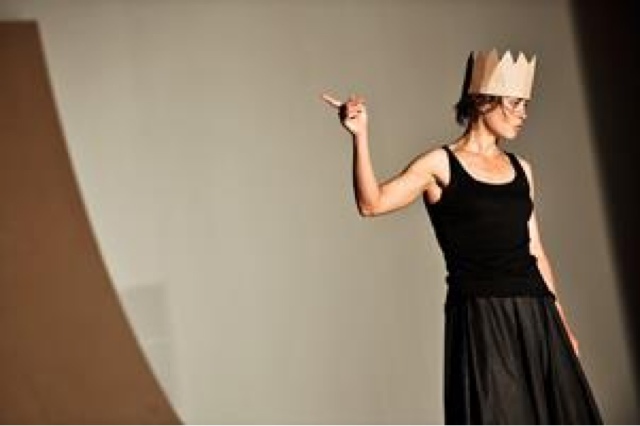This new translation which premiered with the Deutsches Theater (Berlin) in August 2012 takes the many plays comprising the Oedipus myth and combines them; we begin with Oedipus Rex, are thrust into Seven Against Thebes after his blinding, see a sprinkling of The Phonecian Women (and I am quite certain Oedipus at Kolonus, though my very dodgy German may betray me) and finally we fall into Antigone. All of this happens in just a couple short hours. The result of combining the pieces of the myth from their respective longer plays into shorter bits is that the hubris of this family, their fatal flaw, is crystal clear. Each of the characters dives into power, willful to set things "right", and each of them learns of their terrible error and the pain it causes.
First, the staging - within a traditional theatre space, the stage has been morphed into a white bowl, with stark and visible lighting, within which rests a large unfinished wooden curve extending from the front row of the audience up the back wall. The actors enter and exit down log runways on either side of the curve stage, echoing their footsteps in loud shoes. Every movement within this space was highly specified, self-aware and yet highly emotionally connected. It is as if the concept of verfremmdungseffekt is as inherent as breathing for these performers. There were countless visual moments which caught me in the pit of my stomach, but none more so than the moment toward the end of Seven Against Thebes/beginning of Antigone in which the characters (at varying times and sometimes together) ran up the curve, then slid down, countless times, exhausting themselves yet continuing to push on in futility. The simplicity of the direction was outstanding.
Finally, I would be remiss not to mention the brilliant Susanne Wolff. The usher we spoke with in advance of the show advised that she has built a career on playing men, and in this instance was the most powerful Kreon I could have imagined. Strong and wilful, she played such an understated fiery soul, peppered with beautiful physical work. I could not take my eyes from her, and as the piece progressed into Antigone, when she assumed a key role, this feeling grew. There was a moment when Menoikus was arguing, and physically got right up into her face. A lesser performer would have done something, even minute, to indicate their displeasure. Wolff did absolutely nothing, with chilling effect. In short, she was unbelievable.
I am extremely grateful to have happened upon this in my short time in Berlin; it has excited me to consider returning to my own grapple with the Greeks, and Antigone specifically, No More Prayers.
